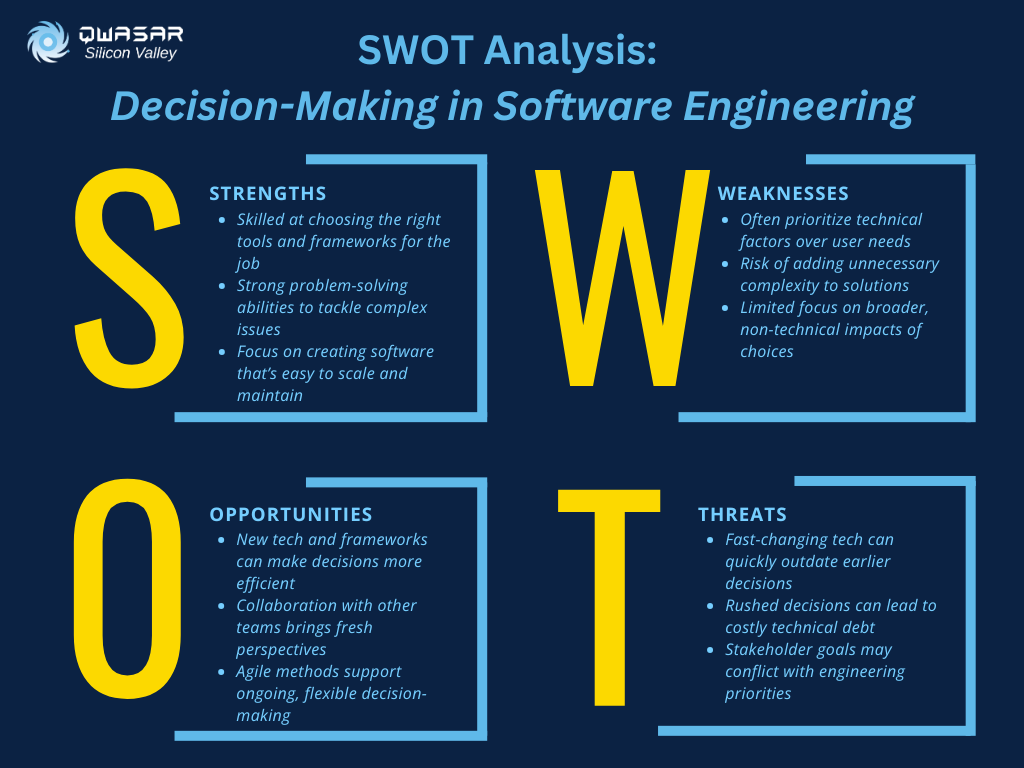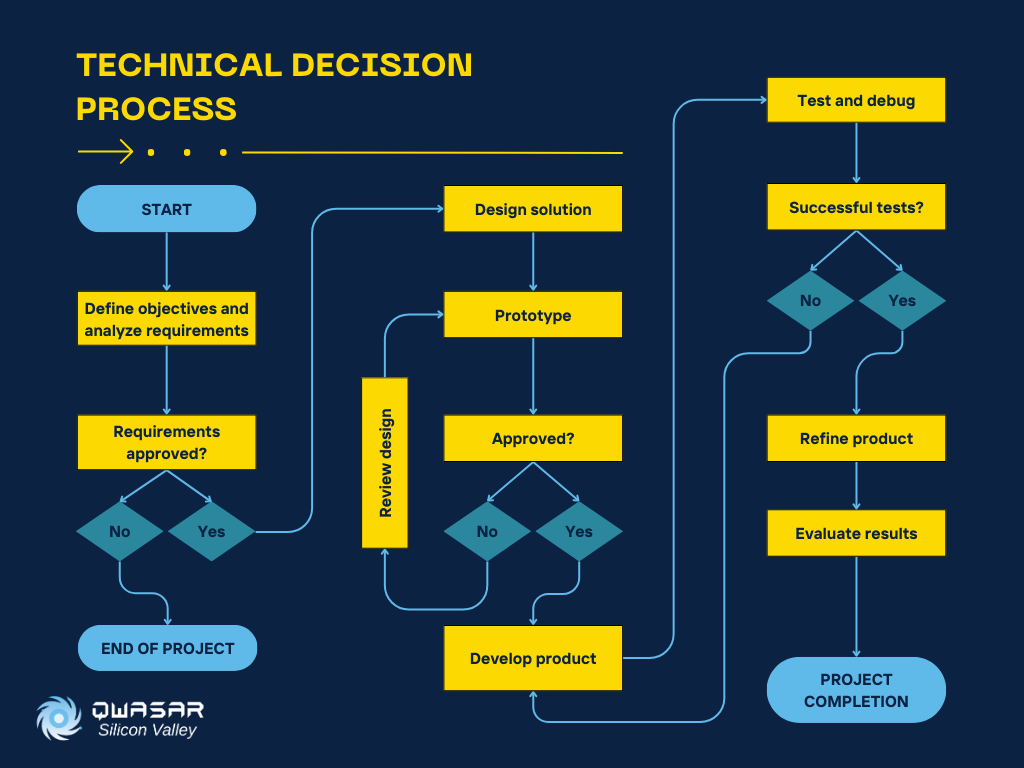Why Decision-Making Skills Are Critical for Software Engineers
In the field of software engineering, decision-making is more than just a skill—it’s a core competency. Each line of code, every architectural choice, and all tool selections impact the immediate success of a project and its future scalability and maintainability. Effective decision-making enables software engineers to navigate complex technical challenges, work seamlessly with teams, and deliver high-quality, adaptable software that stands the test of time. Let’s dive into why decision-making is so crucial for software engineers, the types of decisions they make, and practical ways to strengthen this skill.
Why Decision-Making Skills Matter for Software Engineers
Decision-making affects every part of the development process. From selecting the best programming language to structuring a scalable backend architecture, software engineers constantly make choices that influence how well a project will perform and adapt to future changes. Good decision-making helps create software that’s easy to maintain, with minimal technical debt that could slow down future development. Poor decisions, however, can lead to setbacks, including inefficient code, security vulnerabilities, or costly redesigns down the line.
Decision Points That Define Success in Software Engineering
- Architecture Design: Choosing between monolithic and microservices architecture impacts scalability, flexibility, and integration with other systems.
- Technology Stack Selection: Selecting the right languages, libraries, and tools impacts productivity and project maintenance.
- Feature Prioritization: Engineers must balance user needs with technical feasibility, ensuring valuable features are delivered without overextending resources.
- Performance, Security, and Cost Trade-offs: Engineers often need to balance competing priorities, choosing optimal trade-offs for project success.

Types of Decisions Software Engineers Regularly Make
Software engineering involves a range of decisions, from highly technical to collaborative and business-oriented. Each type of decision calls for specific approaches and information sources to achieve the best results.
Technical Decisions
Technical choices, such as selecting algorithms, frameworks, and development tools, define the software’s functionality and performance. For instance, an engineer might choose a NoSQL database over SQL for scalability or select a language aligned with the project’s requirements, like Python for data analysis or Rust for systems programming.
Architectural Decisions
Architectural decisions focus on system structure, influencing scalability, security, and maintainability. Engineers may decide between a microservices or monolithic architecture, each with distinct impacts on project flexibility and future integration possibilities.
Team Decisions
In team environments, decisions include task delegation, workflow management, and communication. Choosing the right collaboration tools, methods for code review, and task prioritization can improve efficiency and build a collaborative culture.
Business-Related Decisions
Software engineers also make decisions that impact the business side, such as estimating timelines, managing client expectations, and aligning development efforts with overall business goals. Understanding the business implications of technical decisions ensures that projects fulfill both technical and organizational requirements.
Key Factors in Effective Decision-Making for Engineers
Great decision-making requires a mix of data, intuition, and flexibility. Here’s a look at the critical factors that enable effective decisions in software engineering.
Data-Driven Approach
Using a data-driven approach ensures decisions are grounded in metrics, user data, and performance benchmarks. This reduces risks by relying on objective information to guide choices.
Experience and Intuition
Experience plays a vital role, as engineers develop intuition through past projects, learning from both successes and mistakes. Soft skills like communication and empathy also contribute to better decision-making by facilitating constructive feedback and understanding team dynamics.
Trade-Offs and Prioritization
Projects often involve balancing competing factors like time, performance, scalability, and simplicity. Skilled decision-makers learn to prioritize effectively, finding an optimal balance that drives project success.
Risk Assessment and Mitigation
Good decision-makers assess potential risks and create strategies to address them. By evaluating outcomes and their likelihood, engineers can proactively address potential threats to the project’s success.

Tools and Techniques to Improve Decision-Making Skills
Many tools and frameworks can support engineers in making structured, informed decisions.
- Decision Matrices and Frameworks: Tools like SWOT analysis and RACI matrices help evaluate options systematically and clarify roles within the team.
- Agile Methodologies: Agile’s iterative processes support adaptive decision-making, enabling teams to refine approaches based on real-time feedback.
- Code Review Processes: Code reviews foster collaborative decision-making, ensuring that code meets project standards and is maintainable.
- A/B Testing and Experimentation: Experimenting with multiple options provides empirical data to guide decisions, especially for user experience enhancements.
How Software Engineers Can Develop Strong Decision-Making Skills
Decision-making is a skill that can be cultivated through practice and continuous learning. Here are some practical ways for software engineers to enhance their decision-making abilities.
Practice Problem-Solving
Engaging in coding challenges, side projects, and hackathons gives engineers real-world problems that demand effective decision-making under time constraints. Such experiences provide insights into how different choices impact overall project outcomes.
Collaboration with Cross-Functional Teams
Working with cross-functional teams, clients, and stakeholders exposes engineers to various perspectives. Learning to integrate feedback from diverse sources enhances decision-making by broadening the scope of considerations.
Continuous Learning
Staying current on new tools, technologies, and industry best practices is essential. Building a knowledge base enables engineers to make confident, well-informed decisions that align with both technical and business goals.
Better Decision-Making Skills Lead to Better Software
Strong decision-making is at the core of effective software engineering. It influences not only the quality of code but also project timelines, team dynamics, and overall project success. By actively honing their decision-making abilities, software engineers can produce high-quality, maintainable software that meets business needs and user expectations. Every decision matters, whether it’s choosing a framework, prioritizing features, or balancing trade-offs—each brings you closer to becoming a more impactful software engineer.


